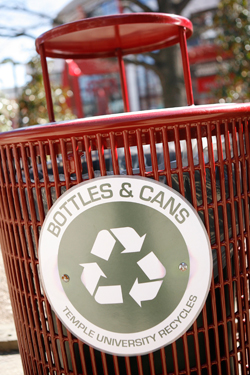Ryan S. Brandenberg/ Temple University
When President Ann Weaver Hart signed the American College & University
President’s Climate Commitment in April 2008, Temple made a pledge to reduce
its carbon footprint and promote sustainability. Now, two years later, the university has received two recent prestigious accolades for its efforts.
First, The Princeton Review has selected Temple for inclusion in its “Guide to
286 Green Colleges,” a comprehensive guidebook focused on institutions of
higher education that have demonstrated an above average commitment to
sustainability.
According to its editors, the guide profiles the nation’s most environmentally
responsible campuses. From solar panel study rooms to the percentage
of budget spent on local and organic food, the guide looks at an institution’s
commitment to building certification through LEED green building certification;
environmental literacy programs; formal sustainability committees; use of
renewable energy resources; recycling and conservation programs and more.
Temple’s Office of Sustainability, created shortly after the signing of the
ACUPCC, has helped the university progress in many of these areas. The office has established the university’s energy conservation policy; provides funding for undergraduate research projects; and has developed the long range Climate Action Plan to achieve carbon neutrality, expand research and community engagement and integrate sustainability into the curriculum. Already the university offers 46 undergraduate courses and 22 graduate courses focusing on the environment and sustainability.
Temple is one of eight colleges and universities in the Philadelphia area included in the guide. The others are Bryn Mawr College, Drexel University, Haverford College, Swathmore College, the University of Pennsylvania, Ursinus College and Villanova University.
The 286 Princeton Review Green schools received scores in the 80th percentile
or higher among the 697 schools rated.
Temple has also received a 2010 Waste Watcher Award from the Professional
Recyclers of Pennsylvania (PROP). According to PROP, the Waste Watcher
Award is given to Pennsylvania institutions “that make reducing, reusing,
recycling and composting top priorities throughout the year.”
Temple’s Recycling Office, which handles many of the university’s sustainable waste management programs, reports that the university diverted more than 1,600 tons of material from the waste stream in 2009. This included the traditional recycling of paper and plastic, as well as materials such as food waste, computers, tree branches, sheet metal and more.
This success was aided by a number of additions to Temple’s recycling program
over the past year, including the conversion of public receptacles to dual stream containers, capable of collecting mixed paper and commingled bottles, and a cardboard compactor at the Louis J. Esposito Cafeteria.
— Kyle Bagenstose
|
